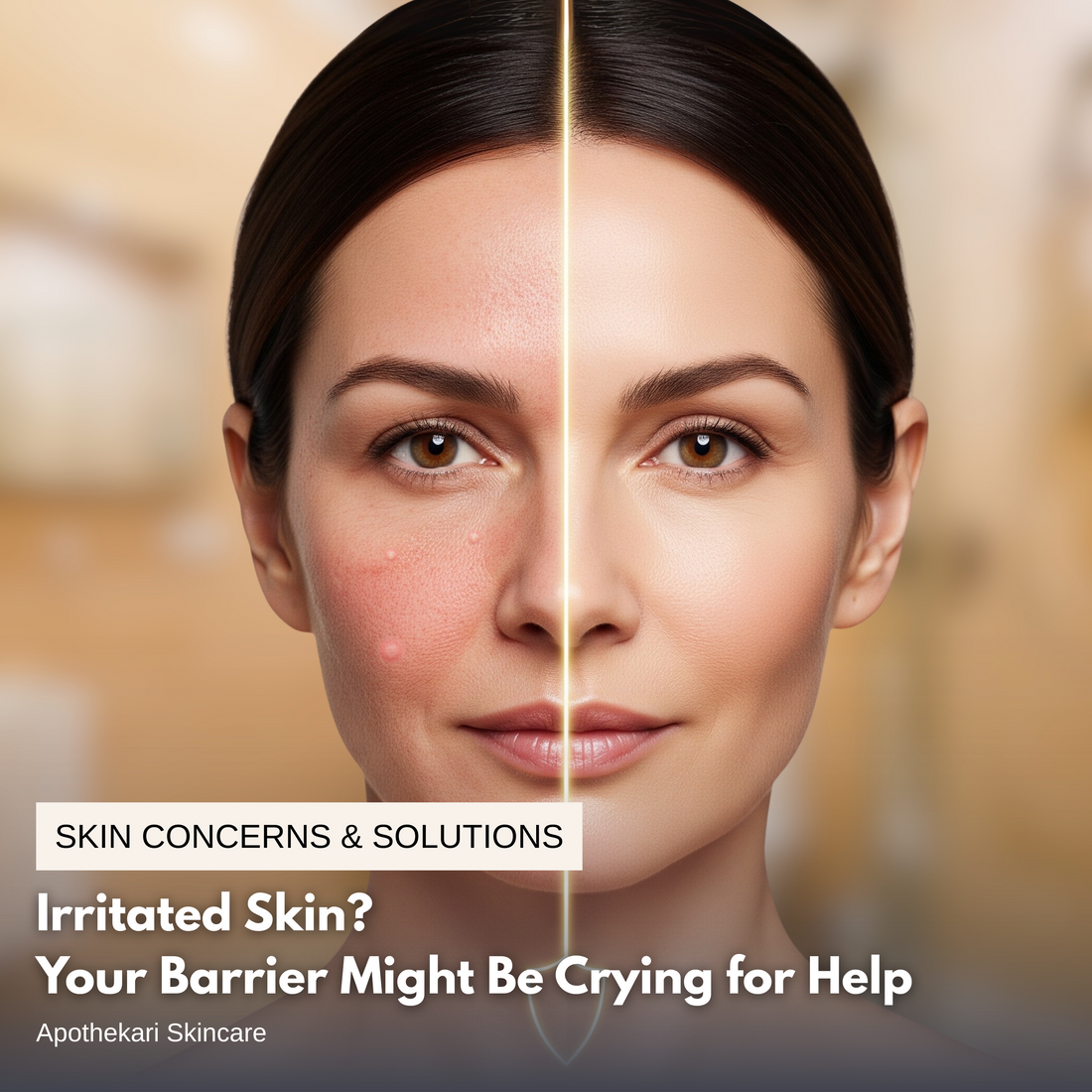Blog
Irritated Skin? Your Barrier Might Be Crying for Help
Skin suddenly acting up? Hormonal shifts can weaken your skin barrier, causing dryness, irritation, and breakouts. The fix: gentle care, deep hydration, and a simple routine to restore your glow.
Learn moreYour Natural Deodorant Spray for Sensitive Skin
Looking for a Deodorant That Won’t Irritate Sensitive Skin? Let’s be honest—finding a deodorant for sensitive skin that actually works can feel like searching for a unicorn. Many natural deodorants make big promises but don’t deliver. Some leave you feeling sticky, others cause irritation, and a few just… don’t work. If your skin has ever reacted to baking soda, aluminum, or artificial fragrance, you already know the struggle. So what’s the solution? That’s where Apothekari’s Barely There Natural Deodorant Spray steps in. With a subtle citrus scent, skin-loving ingredients, and triple odor protection, it’s designed to work with your body—not against it. Whether you’re battling hormonal shifts, menopause odor, or everyday sweat, Barely There offers effective, gentle protection. Why Sensitive Skin Needs Special Care Skin Sensitivities Aren’t Just a Trend If you’ve ever experienced redness, itchiness, or burning after applying deodorant, you’re not alone. Many people with sensitive skin react to common ingredients like baking soda or synthetic fragrances. Sensitive underarms demand a different approach—one that’s thoughtful, targeted, and gentle. Common Irritants in Traditional Deodorants Aluminum: Often used in antiperspirants, but can clog pores and irritate. Parabens: Preservatives that may disrupt hormones. Baking Soda: A popular natural alternative, but highly alkaline and rough on sensitive skin. Barely There is free of all these. Because clean shouldn’t mean compromised. Barely There: What Makes It the Best Deodorant for Sensitive Skin? It’s Powered by Science (and Nature) At Apothekari, we know that your skin deserves a formula that does more than just mask odor. Barely There uses a Triple Odor Protection system: Saccharomyces Ferment: Natural enzymes break down odor-causing sweat molecules. Glycolic Acid: Keeps your skin’s pH low, making it less friendly to odor-causing bacteria. Ethylhexylglycerin: A skin-safe probiotic that supports good bacteria to keep the bad at bay. Light Citrus Scent, Barely There Feel This isn’t your average spray. Scented with just a whisper of bergamot, Barely There is perfect for those who want freshness without fragrance overload. It dries quickly, feels light, and won’t leave residue behind. The scent disappears within seconds—so you feel clean, not perfumed. Safe for All Your Body’s Places Unlike other products, this deodorant for sensitive skin is made for your whole body. Yes, even your private areas. You can use it: Under your arms Under your breasts On your inner thighs Anywhere sweat happens Because body odor doesn’t only happen in one place. Why It Matters Changing Bodies Need Smarter Care As hormone levels shift, so does body odor. Many women find that their old deodorants suddenly stop working. That’s because sweat glands become more active, and body chemistry changes. Barely There was designed with this in mind—it works even through menopause. How to Use It Effectively Simple Steps for Everyday Freshness Shake gently before use. Spray 2-3 pumps onto clean, dry skin. Let it dry completely before dressing. Reapply if needed—but most users don’t have to. Pro Tip: If you’ve just shaved, wait a few minutes before applying. While Barely There is gentle, sensitive skin post-shaving can react more strongly to anything. Real Ingredients. Real Results. No Gimmicks—Just Ingredients That Work Caffeine: Calms inflammation and soothes skin. Allantoin: Hydrates and promotes healing. Essential Oils: Offer natural antibacterial protection and a mild scent. What You’ll Never Find Inside: Aluminum Baking soda Parabens Synthetic fragrances Sticky residue This is why it stands out as the best deodorant for sensitive skin. What Customers Are Saying LoveBlack (Castle Rock, US) “It keeps me feeling fresh all day long. I really couldn’t be happier!” Marcela Desverney (West Milford, US) “Unfortunately didn’t work for me. It also stung a bit after shaving. But I love the packaging and scent.” Apothekari Response: We take every review seriously. If it doesn’t work for you, we offer a 100% money-back guarantee. What to Expect When Switching to Natural Deodorant Detox is Real Your body might go through a brief detox when switching from traditional deodorants. You may sweat more or notice stronger odor at first. Stick with it—it typically balances out in 1-2 weeks. Stick With It Barely There is made to work with your skin’s natural ecosystem. Give it time to fully adjust. Sustainable, Ethical, and Safe Our Promise to You Made in certified North American labs Never tested on animals (only the human kind!) Eco-conscious packaging Backed by science and customer satisfaction Final Thoughts: Is This Deodorant for Sensitive Skin Worth It? Absolutely. Barely There offers a unique blend of science-backed ingredients and natural goodness. If you’ve been frustrated by deodorants that irritate or underperform, this is your moment to try something new. It’s not just about smelling good—it’s about feeling confident in your skin. With Barely There, you get effective protection without compromise. Ready to try the deodorant for sensitive skin that finally does it all? 👉Shop Barely There Natural Deodorant Spray and give your skin the care it’s been craving. Still Not Sure? Take our Skincare Quiz to find your perfect routine. 💛 Join our FREE 5-Day Wellness Challenge for exclusive skincare tips, personalized product recommendations, and 15% off your first order! Your skin deserves better. Let’s make the switch together.
Learn more9 Vitamin C Myths You Must Stop Believing
Although it’s a superstar skin care ingredient, there are many vitamin C myths circulating around when it comes to skin care. We’ve written about its benefits before, and in this post, we’re debunking the 9 most common vitamin C myths and setting the record straight. Shop Bespoke Vitamin C 15% Shop Bespoke Vitamin C 10% 1. All vitamin C is the same While the front of your bottle may read as just simply containing vitamin C, in the ingredient list, it can show up as L-ascorbic Acid (pure vitamin C) or other forms including ascorbyl glucoside, magnesium ascorbyl phosphate, ascorbyl tetraisopalmitate, etc. While they are all called vitamin C, they differ in the results they deliver. Plus, each type may be tolerated differently when it comes to your skin. So what type of vitamin C is best? We’re big fans of L-ascorbic acid, because it’s backed by the most amount of research when it comes to its benefits for skin–boosting collagen production; inhibiting melanin synthesis, which contributes to age spots; exfoliating for more glowing skin, etc. It’s what’s in our Glow Getter 15% and 10% Serums. However, if your skin is really sensitive, you may not be able to tolerate L-ascorbic acid, in which case you can look for a formulation made with a different vitamin C derivative. 2. Does vitamin C make your skin sensitive? No, it doesn’t. Vitamin C is acidic, which is why this myth may have gained traction. Vitamin C hasn’t been shown to increase sensitivity to the sun. In fact, studies show that this powerful antioxidant ingredient helps protect against free radical damage from the sun, boosting the protection you get from sunscreen. So, you can apply your vitamin C product in the a.m. or p.m. (or both), depending on what benefits you’re seeking and how it feels in your routine. Daytime application delivers antioxidative benefits, while nighttime application helps more with firming and rejuvenation–though you will also get some of these benefits with daytime application as well. 3. Vitamin C can replace your sunscreen While it’s true that vitamin C helps to protect against the sun’s ultraviolet rays, it is not—and should not be used as—a sunscreen. Vitamin C is one of the strongest defenders against free radicals– unstable molecules that damage skin–and which are caused by exposure to sunlight, pollution and smoke. Think of sunscreen as your first line of defense, helping to block damaging rays, with vitamin C as its assistant, helping to protect against free radicals that make it through the sunscreen’s protection. 4. You can become resistant to it This myth tends to circulate about many skin care ingredients; not just vitamin C. First, it’s important to understand that resistance happens when the number of receptors decrease. Since vitamin C is not active at any specific receptor in the skin, resistance can’t occur. Think of it another way. Vitamin C is not only good for your skin, it’s good for your overall health. If you’re eating nourishing foods every day, chances are that they are high in vitamin C and your body definitely isn’t becoming resistant to the benefits of the strawberries or kale salad that you’re eating on the daily. If a vitamin C formula is working for you, there’s no need to worry that it’s going to stop working. 5. Higher concentrations are always better When it comes to vitamin c myths, this may be the most common one! However, with skin care products, more isn’t necessarily better, because your skin can only absorb so much. Plus, because vitamin C is acidic, higher concentrations can end up being quite irritating. In fact, studies have shown that concentrations of L-ascorbic acid greater than 20% can actually be damaging to skin. As long as you are using a vitamin C treatment from a reputable company, you can feel confident that they’re following guidelines for skin care ingredients that have been established in clinical studies. Whether it’s 0.5%, 1% or 10% doesn’t matter–what matters is that the amount used has been researched to deliver results, without harming skin. 6. Vitamin C can’t be used by sensitive skin Vitamin C can be suitable for all skin types. Is vitamin C ok for sensitive skin? The trick is to find the right type of vitamin C for you. For example, while L-ascorbic acid is the most widely researched–and potent–form of vitamin C, it can also be irritating to sensitive skin. If that’s the case, you can opt for a lower concentration or use it less frequently. If that doesn’t work, then try a form that isn’t so acidic. There are many to choose from, including tetrahexyldecyl ascorbate, magnesium ascorbyl phosphate and ascorbyl glucoside. 7. Vitamin C can’t be combined with other acids, retinol, or niacinamide When it comes to vitamin C and niacinamide, there’s an outdated study that shows the two can potentially react to form nicotinic acid, which can cause skin irritation. However, this potential exists only when pure ascorbic acid and niacinamide are combined together at very high temperatures. Thankfully, it’s not something we need to worry about when it comes to skin care. In fact, pairing these two ingredients can be a winning combination, especially for tackling hyperpigmentation because the two work in different ways to combat discoloration: vitamin C inhibits the production of the pigment responsible for age spots, while niacinamide helps prevent the transfer of the overproduced pigmentation within cells. What about combined with acids or retinol? Vitamin C can be used with retinol, but there is a risk of skin irritation when they are used together. If you want to include both in your skin care routine, we recommend spreading out your actives between your morning and night routine or even between days or weeks. ie vitamin C in the morning and retinoid at night. Can you use vitamin C and AHA (or other acids) together? As with retinoids, your skin can become irritated with these two ingredients are combined. Space them out (morning/night) or alternate the days that you use one or the other. 8. Vitamin C can discolor your skin Vitamin C actually does the opposite! It inhibits the production of tyrosinase, an enzyme that is involved in the production of melanin, the pigment that gives skin its coloring—and which is associated with age spots and hyperpigmentation. The end result is brighter and more evenly toned skin; not discolored skin. 9. DIY vitamin C is a good idea While it’s possible to mix up your own vitamin c serum at home, there are a couple of things to be mindful of: Foods high in vitamin C, like lemon and other citrus juices can lead to phytophotodermatitis, a painful reaction, that can cause skin to blister and break out in drak patches. Don’t do this at home, no matter how many internet searches tell you it’s safe and effective. If you mix your own vitamin C serum, be sure to mix it fresh every day. Vitamin C oxidizes very quickly resulting in a product that may not only be ineffective, but also harmful. Plus, water-based products need preservatives to ensure they don’t become contaminated with baceteria, mold or fungus. Even if refrigerated, they won’t stay fresh for long. We like to think that this is one thing best left to the experts. Did we cover all the vitamin C myths you may have questions about? Let us know in the comments so we can get to more myth busting for you.
Learn more



